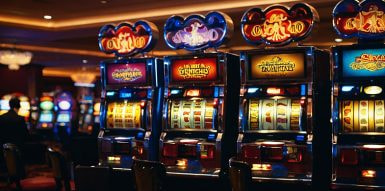What is Pachinko?
The pachinko games are slot-like machines that use small steel balls, which are rented to the player by the pachinko parlour. The pachinko balls are not only the object to play with but also the bet and the prize. The game itself functions rather easily. The player loads one or more balls into the machine, then presses a handle, which is attached to a padded hammer inside the machine. The hammer launches the ball into a metal track, which guides the ball on its way to the playing field. The field is full of small cups, that would bring the player a prize if the ball falls there. On the opposite, the ball would fall into a hole in the bottom. A ball which enters a catcher would trigger a payout, in which various balls would be dropped at a tray in front of the machine. The idea behind the game is to capture as many balls as possible and then exchange them for prizes. For a visual demonstration, we have prepared a short video preview, which you can watch below.
Why Are the Pachinko Machines So Profitable?
Gambling is illegal in Japan. Pachinko parlours, however, have found a legal loophole, which allows them to operate. The pachinko games do not reward players with money but rather with material prizes such as bags, shoes and even electronics. Players, however, can choose to exchange their gifts for money at special establishments usually located nearby the parlours. The police tolerate these actions due to the fact that the gift exchange is not handled by the parlours themselves. In the past, the cash exchange used to be controlled by the yakuza mafia but that has changed due to the police efforts in the past few decades.
There are currently more than 10,000 pachinko parlours and one out of 11 Japanese people is a regular visitor. According to recent statistics, the popularity of the games has grown so much that they now employ 10 times more people than the top 10 car manufacturers in Japan. An interesting fact is that the industry is mostly run by Korean Japanese people who saw the pachinko parlours as their only employment option after World War II.
Nowadays, however, the pachinko parlours are not only seen as an industry that hires many people, but also as the best destination for the Japanese people to pass their leisure time. The game itself is not only easy but also entertaining, which many people find attractive and useful as a stress-release method. As we mentioned above, the industry is earning more than £150 billion per year, which is 30 times more than the annual gambling revenue generated in Las Vegas.
Government of Japan Acts Against the Pachinko Parlours
It has been established that the pachinko industry does not only generate great profits, but it can also have harmful addictive effects on players. According to statistics, a big part of the Japanese population visits the pachinko parlours at least once a week. Thus, the Government has decided to take certain measures to restrict the effect the pachinko games could have on people. According to a newly introduced law, the payouts of each pachinko machines shall be cut with 1/3, meaning that players should not be able to receive more than $450 in a four-hour session. Additionally, the Government of Japan has decided to lift the ban on casinos. In order to avoid gambling addiction, however, local residents will be limited to three visits a week and will be charged an entry fee. While the lawmakers hope that their new actions would reduce pachinko’s harmful effects on people, it is also a fact that the pachinko industry has gone through a small crisis as many pachinko cafes have closed in the last few years and the interest among the younger Japanese people is generally decreasing.



